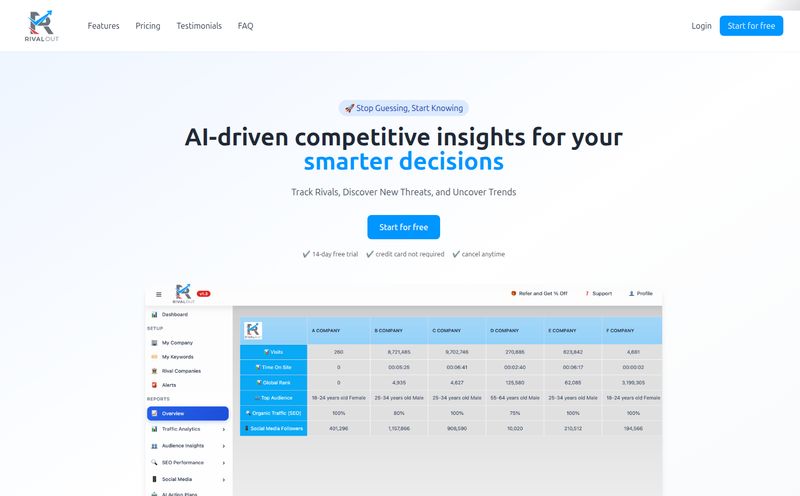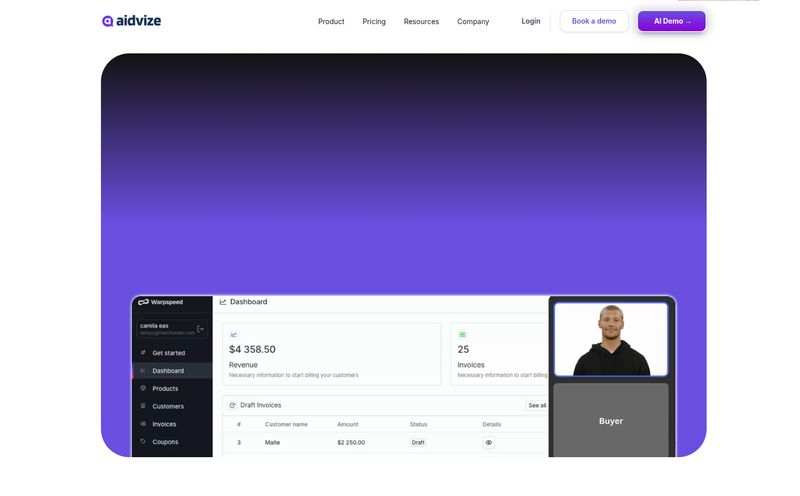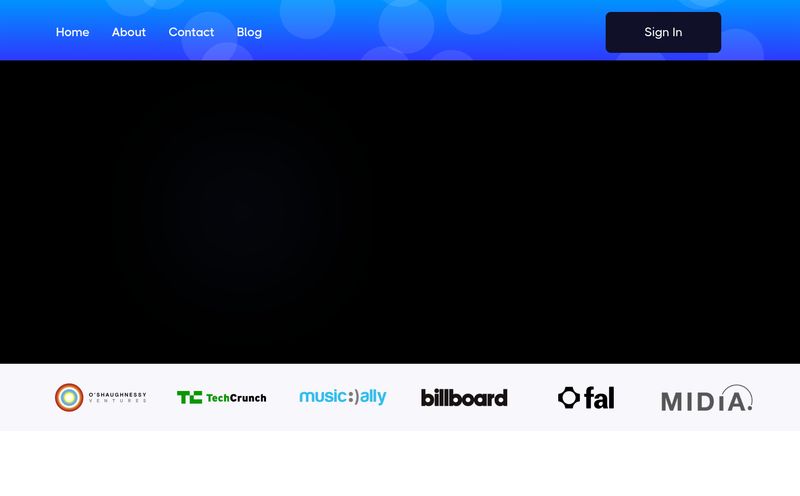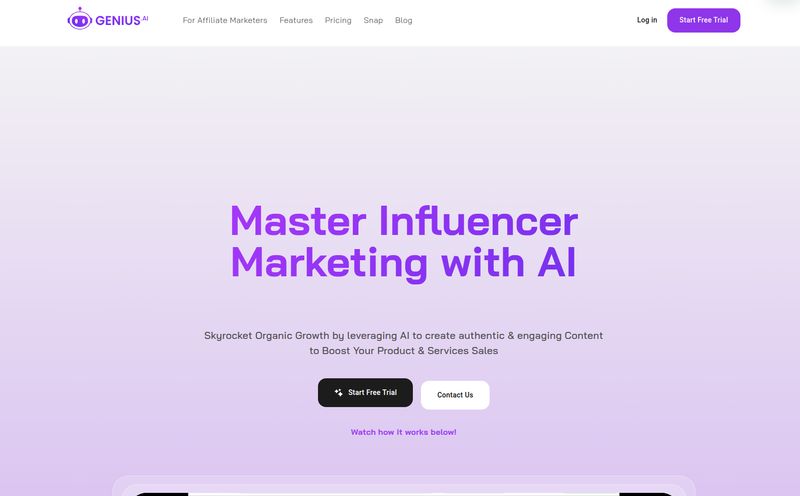If you're in the trenches of digital marketing, you know the drill. You're swimming in a sea of data from Google Analytics, juggling ad campaigns on Facebook and Google, and trying to squeeze out one more creative idea before your brain turns to mush. It’s a grind. Some days you feel like a data scientist, others a graphic designer, and occasionally, a magician trying to pull a positive ROI out of a hat.
For years, we've been promised tools that would make it all easier. And a lot of them just add another dashboard to our already-crowded browser tabs. So when another "AI marketing solution" pops up, my professional skepticism kicks in. Hard. But then I stumbled upon Shakespeare AI, and I have to admit, my curiosity was piqued. Their tagline isn't about replacing you; it's about being your "AI marketing co-pilot." I like that. It's less 'Terminator' and more 'Jarvis'. So, I decided to take a look under the hood.
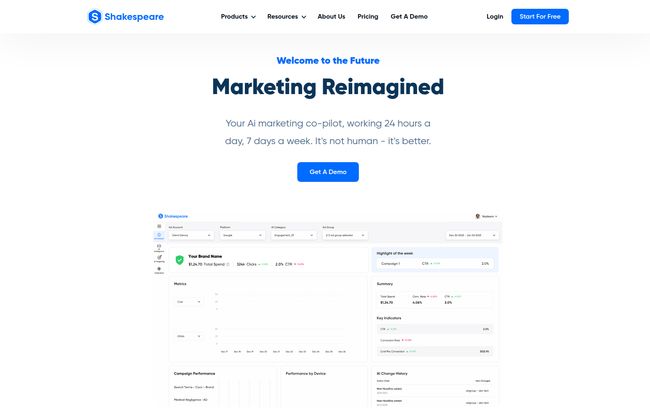
Visit Shakespeare AI
So, What Exactly is Shakespeare AI?
At its core, Shakespeare AI is an artificial intelligence platform designed specifically for us—the marketers. It’s not just another AI copywriter that spits out generic social media captions. Think of it more like a strategic partner. It plugs into your existing marketing platforms (like Google and Facebook Ads) and uses AI to analyze performance, pinpoint the perfect audience, and even help generate the creative assets you’re spending hours agonizing over.
It’s designed to turn that overwhelming firehose of data into actionable decisions. Instead of you manually sifting through spreadsheets to figure out which ad creative is actually working, Shakespeare aims to do that heavy lifting for you. In real time. The goal is to help you make decisions based on data, not just a gut feeling... though I'll always argue for a little bit of intuition.
Breaking Down The Core Features
Okay, let's get into the nitty-gritty. What does this thing actually do? It's not just one magic button; it's a suite of tools working together.
Hyper-Personalized Audience Targeting
We've all been there, setting up ad audiences. You start with demographics, layer on some interests, and hope for the best. Shakespeare AI takes this a step further. It analyzes your existing customer data and campaign performance to identify and build audience cohorts with what they call 'pinpoint accuracy'. It's about finding the people who not only look like your best customers but behave like them too. It’s the difference between throwing a wide net and using a high-tech fishing lure designed to attract exactly what you want to catch.
The Data-Driven Creative Studio
Creative burnout is real. Coming up with fresh ad copy and concepts is exhausting. Shakespeare’s Creative AI is a fascinating feature that automates this process. It doesn't just write text; it analyzes top-performing ads and generates new creative variations based on what's proven to work. For me, this is a huge deal. It’s not about replacing human creativity, but about augmenting it. It’s like having a brainstorming partner who has seen millions of ads and knows what gets clicks. A pretty good partner to have, right?
Performance Optimization in Real-Time
This is where my inner PPC nerd gets excited. The platform offers real-time optimization. It's constantly watching your campaigns, A/B testing variables, and shifting budget to the top performers automatically. We all try to do this manually, checking in on our campaigns daily or weekly. But the platform does it 24/7. It creates this constant feedback loop between the ad, the audience, and the performance, making micro-adjustments faster than any human possibly could. This is how you get that incremental, compounding growth that really moves the needle.
Seamless Cross-Platform Integrations
If you've ever tried to create a cohesive report from Google Ads and Facebook Ads data, you know the pain. It’s like mixing oil and water. Shakespeare AI centralizes this by integrating directly with your ad accounts, CRMs, and other tools. The idea is to give you one unified dashboard to see the whole picture. This reduces the time you spend jumping between platforms and helps you see how efforts on one channel are impacting the other. A single source of truth? Yes, please.
Who Is This Tool Really For?
I see Shakespeare AI fitting into a few different camps. If you're a solopreneur or a small business owner wearing all the hats, the Basic plan could be a lifesaver. It automates a huge chunk of the optimization work you probably dont have time for. For in-house marketing teams at small to medium businesses, the Professional plan seems like the sweet spot. It allows for more users, handles more ad spend, and adds handy features like Slack notifications. It empowers the team to manage both Google and Facebook from one place. And of course, for large enterprises and agencies managing massive budgets, the Enterprise plan offers the customization and dedicated support they would need. It's not really a one-size-fits-all tool, and the tiered structure reflects that pretty well.
Let's Talk Turkey: Shakespeare AI Pricing
Alright, money talk. No tool is great if it breaks the bank. The pricing is refreshingly transparent, which I appreciate. You can pay monthly or get a decent discount (around 20%) for paying yearly. A smart move if you ask me.
Here’s a quick rundown of their plans:
- Basic Plan: This starts at $149 per month (or $119/mo if billed annually). It’s designed for individuals and small businesses, includes one platform (your choice of Google or Facebook), and covers up to $5,000 in monthly ad spend. You get the core AI Optimization and Creative Studio features.
- Professional Plan: This one is $249 per month (or $199/mo annually). It’s the most popular and built for growing businesses. You get both Google and Facebook, up to 5 users, priority support, and it handles a much larger ad spend of up to $250k.
- Enterprise Plan: This is a Custom Plan for the big players. If you're a medium-to-large business or agency, you'd contact them for a quote tailored to your needs, which will include custom tools and dedicated support.
They also offer a 7-day free trial, which I always recommend. Get in there, connect an account, and see if it actually feels right for your workflow before you commit.
The Real Talk: Where It Shines and Where It Might Falter
No tool is perfect. Let's look at both sides of the coin. On the plus side, the AI-driven insights are a massive win. The ability to automate creative generation and run real-time optimizations can save an incredible amount of time and improve results. The hyper-personalized targeting is also a standout feature that could seriously boost campaign efficiency.
However, there are things to consider. My one big hesitation with any tool like this is the potential to over-rely on the data. Marketing is both a science and an art. The AI can handle the science, but you still need that human intuition, that spark of a crazy idea that no algorithm would ever come up with. It's a co-pilot, not the pilot. Secondly, for those new to advanced marketing tools, there might be a bit of a learning curve. You have to be willing to spend a little time getting it set up and understanding how to interpret its suggestions. It’s not a magic wand, it’s a power tool—you still have to learn how to wield it.
FAQs About Shakespeare AI
I've seen a few questions pop up about this tool, so let's tackle them head-on.
What is Shakespeare AI and what do you offer?
In short, it's an AI platform that helps you improve your marketing. It connects to your ad accounts (like Google/Facebook) to help you find better audiences, create more effective ads, and automatically optimize your campaigns for better performance.
Is Shakespeare AI suitable for small businesses and large enterprises alike?
Yep. They have different pricing tiers specifically for this reason. The Basic plan is built for small businesses or even solo operators, while the Professional and Enterprise plans scale up with more features, users, and support for larger companies.
Do I need technical expertise to use your tools?
I'd say you need to be comfortable with marketing concepts, but you don't need to be a developer. The platform is designed to be user-friendly with a dashboard. There might be a small learning curve, like with any new software, but you don't need to know how to code or anything like that.
Is my data safe with Shakespeare AI?
This is a big one for any third-party tool. According to their site and general best practices, platforms like this use secure connections (APIs) to access your data and have privacy policies in place. They need your data to make optimizations, but it should be handled securely. Always a good idea to review the privacy policy yourself!
My Final Verdict
So, is Shakespeare AI worth the hype? In my opinion, yes, for the right person. If you're feeling bogged down by the day-to-day grind of managing CPC campaigns and are looking for a way to work smarter, not just harder, it's a very compelling option. The idea of an AI co-pilot that handles the tedious data analysis and optimization is the direction marketing is heading.
It won't replace a smart marketer. But it can free that marketer up from the mundane tasks to focus on the big picture strategy. And for me, that's a tool worth its weight in gold. Or, in this case, a reasonable monthly subscription.
